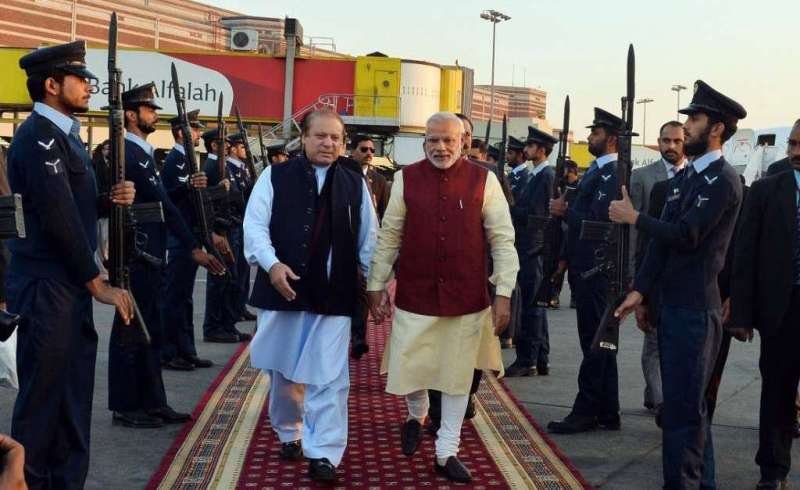Given his close ties to the Pakistani army, and given his troubling approach to counterterrorism—Khan has repeatedly criticised his country for targeting Pakistani terrorists with force—one might reasonably expect New Delhi to be concerned.
In reality, Khan’s arrival on the scene is unlikely to have a major impact on India, or on India-Pakistan relations. And that’s because the Pakistani army—not Khan, or any other civilian leader—calls the shots on policy toward India.
Interestingly, some of Khan’s recent messaging has telegraphed a willingness to engage with India. In a speech on the day after the election, he called for better relations, including more trade ties, with New Delhi.
Met Imran Khan and we shared our experiences in politics. Both challenging status quo in respective countries pic.twitter.com/XsFuT8AYjD
— Arvind Kejriwal (@ArvindKejriwal) March 20, 2016
This is actually unsurprising; Khan has close ties to India from his cricket days, and he still has friends there. As he said in his July 26 speech (perhaps with a touch of hyperbole), “I am the Pakistani who has the most familiarity with India, I have been all over that country.” Indeed, he has been a cricket commentator on Indian television channels, and he speaks favourably of the Aam Aadmi Party. Like Khan’s Pakistan Tehreek-e-Insaf party, the AAP has a singular focus on anti-corruption. Khan met AAP leader Arvind Kejriwal during a trip to India in 2016.
For Khan, who has badly wanted to be premier for two decades, the last thing he would want to do is imperil his hold on power by upsetting the army. When Nawaz Sharif tried to blaze an independent trail and take a more conciliatory position toward New Delhi soon after he began his term in 2013, the army was not pleased—and the stage was set for a long period of turbulence in civil-military relations.
At any rate, aside from the recent public messaging about wanting better ties with India, Khan’s views on India align closely with the army’s. Khan, for example, has repeatedly expressed a strong desire to resolve the Kashmir dispute—an objective, incidentally, that undercuts his stated wish for better relations with India. New Delhi won’t be interested in a formal dialogue if there’s any chance of Kashmir being on the agenda.
Additionally, Khan won’t be that bold civilian leader who prods the army to cut off support to the India-focused terror groups in Pakistan.
“This is someone who was once keen to negotiate with the Pakistani Taliban even as it was wreaking havoc across the country, and who has praised the Taliban insurgency in Afghanistan as a holy war justified by Islamic law.”
If he didn’t want to combat an organisation that terrorized Pakistan for a decade, and if he lavished praise on a brutal war in Afghanistan, then he certainly won’t urge the army to hunt down Hafiz Saeed.
By contrast, consider the cases of China and the United States. Here, potential divergences in views between Khan and the army are discernable. Khan has called for contracts associated with the China Pakistan Economic Corridor to be more transparent, which the army has never proposed. And, he has expressed anti-American rhetoric that may be too harsh for an army that wants to maintain a workable relationship with Washington. With India, there’s little indication of such looming policy divides between Khan and the army.
In effect, with Khan in power, the army will continue to manage India policy.
This shouldn’t bother Khan, given that he and the army largely see eye to eye in their thinking on India.
Ultimately, the India-Pakistan relationship is likely to remain in a stalemate well into next year, and for reasons that have more to do with India than with Pakistan and whoever may be leading its government. India is less than a year from holding its own national elections.
For the BJP, which has taken a harder line on Pakistan since its efforts to engage Islamabad early in its term failed to pay off, reaching out to Pakistan during election campaign season would be a political liability.
For Prime Minister Narendra Modi, the optics of extending an olive branch to Islamabad, or accepting one extended to him by Khan, would be quite poor.
In sum, the idea of a Prime Minister Imran Khan may be unnerving to some in India (because of his ties to Pakistan’s deep state) and heartening to others (because of his stated desire for better relations with New Delhi). But in the end, Khan will have minimal impact on a bilateral relationship destined to suffer regardless of Pakistan’s election outcome.
Michael Kugelman is deputy director for the Asia Program and senior associate for South Asia at the Woodrow Wilson International Center for Scholars in Washington, DC.
